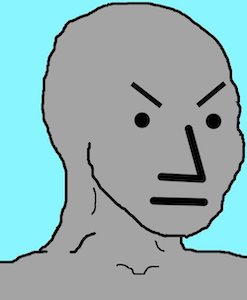We live in curious times when it is the left getting broad traction on what up until a few weeks ago had been the domain of only the most radical of the anarchist-libertarians. They are demanding that the state (what some people call “government”) vis-à-vis its enforcement arm (the police) should play a diminished role in our lives. Unchecked abuses of authority (or rather “privilege”, literally Latin for “private law”) accumulated over space and time have finally reached a boiling point. To be clear, we libertarians have expounded for decades upon the obviously predictable and empirically proven flaws inherent to any state socialized monopoly system such as the police. But I suppose it isn’t until our predictions bear enough fruit that anyone wants to listen. So be it. The police are single payer security: monopoly service coupled with an extortionist payment scheme and zero liability has finally overflowed onto the bathroom floor of modern American society. It is heartening to see that people are finally awakening to the results of flawed incentives while equally depressing that so many have had to suffer death and injustice in order for people to finally take notice en masse. For those that are only capable of binary thinking, I’m not saying, “all cops are bad”. I’m saying that bad incentives produce poor outcomes because of a systemic lack of error correction.
For those communities looking to make a change to their policing system the obvious question is “What will you replace it with?” The simple answer is, “I don’t know.” And that is actually the point. This is why we have (free) markets, to give individuals a space in which to experiment to see which ideas work and which ones do not. Markets produce better outcomes not because of magical capitalist pixie dust but because given a problem to be solved, more minds are better than fewer. State monopoly systems fixate on only one way of doing something and then enforce that method upon all. Any variance from The One way is either outlawed or so heavily regulated as to make any attempt pointless. The state, lacking a profit motive, is incapable of rapid negative feedback (the loss part of profit/loss) if it implements a poor solution; it takes decades of public suffering for anyone to notice the accumulating damage of the failure.
This movement to “defund the police” is the best thing for that industry – in the same way that Obama’s ‘defunding’ of NASA with respect to the Shuttle program has spawned a whole new market for orbital lift companies (Space X, etc.). So how could this private policing/security model work in the real world? The beauty of any market is that it is inherently self-regulating due to the profit motive. For example, one vertical market possibility is this: client—>insurance company—>security company—>training academy. The entity to the right has to work to satisfy the demands of their customer to the left; if they don’t then the customer seeks out a different supplier and that former supplier suffers a loss. Without the state imposing the privilege of qualified immunity the individual police/security officers would carry their own indemnity insurance for their actions or their firm could cover them on their policy, but in either case, officers with a poor claim record would quickly become unemployable in the same way people that have multiple car accidents quickly find their premiums skyrocket. This is the market telling them perhaps they should seek a different career. The desire to prevent this would induce the self-regulation of more stringent training and screenings imposed upon the security firms by the insurance carriers seeking to minimize their claims resulting from rogue officers. Security firms that produce the best outcomes (solve or prevent crimes) would excel and gain more paying customers, those that do a poor job would go out of business – profit guides firms to delivering what the consumer demands: safe, effective, and efficient security.
One common rejoinder to this model is “but what of the poor that can’t afford such security?”: well, please tell me about how “the poor” are receiving such great policing service in our current system? I’ll wait. But in all seriousness, there are many options in a market system, no doors are closed: community policing, á la carte subscription models, insurance pass through protection, charitable organizations, and many more I can’t envision. The next objection is typically “but what about law enforcement?” An indirect benefit of privatizing security/police is that it instantly nullifies all victimless crimes; no victim, no crime to solve and certainly no one to pay for it. Perhaps the laws stay on the books, but without an enforcement arm they are effectively null and void. Good. Nearly half the current prison population is for drug “crimes.” Ending the drug war in this way would create a huge public dividend of the billions not spent on pursuing such cases as well as dramatically reversing the current racial disparity in the prison system.
While it does seem no one is currently calling for anything as radical as what I’ve outlined, the mere fact that the general populace is actively looking for some alternative is encouraging. Even if one community experiments and succeeds it would be the perfect empirical template to show that separation of police and state is no more radical than the separation of church and state.


